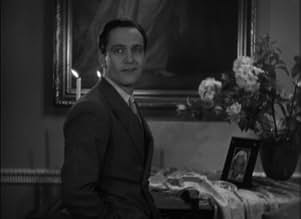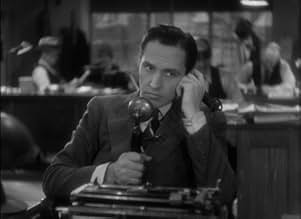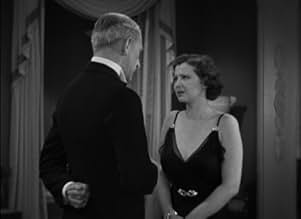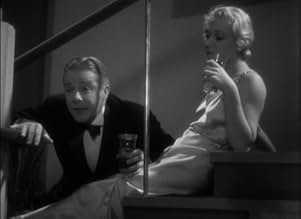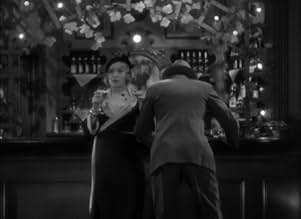ÉVALUATION IMDb
6,9/10
2,2 k
MA NOTE
Ajouter une intrigue dans votre langueA drunken newspaperman is rescued from his alcoholic haze by an heiress whose love sobers him up and encourages him to write a play, but he lapses back into dipsomania.A drunken newspaperman is rescued from his alcoholic haze by an heiress whose love sobers him up and encourages him to write a play, but he lapses back into dipsomania.A drunken newspaperman is rescued from his alcoholic haze by an heiress whose love sobers him up and encourages him to write a play, but he lapses back into dipsomania.
- Director
- Writers
- Stars
- Prix
- 3 victoires au total
Richard 'Skeets' Gallagher
- Buck
- (as Skeets Gallagher)
Ernie Adams
- Reporter
- (uncredited)
Mildred Boyd
- June
- (uncredited)
Edna Callahan
- Bridesmaid
- (uncredited)
Leonard Carey
- Prentice's Butler
- (uncredited)
Harry Cording
- Fred
- (uncredited)
Milla Davenport
- Prentice's Housekeeper
- (uncredited)
Avis en vedette
Fredric March and Sylvia Sidney star in Merrily We Go To Hell, the story of a nice rich girl who falls in love with an alcoholic newspaperman who has ambitions for greater things to turn his writing talents to. The title comes from a favorite drinking toast of March's.
Occasionally Fredric March turned in some fine performances of some dissolute characters. Later on he would get Oscar nominations for A Star Is Born and Death Of A Salesman and his part in this film can be seen as a harbinger of things to come.
For once Sylvia Sidney was not a child of the slums, she's a rich girl here who falls for March who keeps falling off the wagon. When he gets his play finally produced slinky actress Adrienne Allen comes between Sylvia and Fred. Incidentally playing a small role as Allen's lead in the play is Cary Grant.
The story verges into the melodramatic, but Dorothy Arzner gets some good performances from her stars and their support. Pay note to March's reporter sidekick Skeets Gallagher who has some interesting observations.
Fans of the stars should be pleased.
Occasionally Fredric March turned in some fine performances of some dissolute characters. Later on he would get Oscar nominations for A Star Is Born and Death Of A Salesman and his part in this film can be seen as a harbinger of things to come.
For once Sylvia Sidney was not a child of the slums, she's a rich girl here who falls for March who keeps falling off the wagon. When he gets his play finally produced slinky actress Adrienne Allen comes between Sylvia and Fred. Incidentally playing a small role as Allen's lead in the play is Cary Grant.
The story verges into the melodramatic, but Dorothy Arzner gets some good performances from her stars and their support. Pay note to March's reporter sidekick Skeets Gallagher who has some interesting observations.
Fans of the stars should be pleased.
A wonderful and unsettling pre-Code film about an alcoholic playboy (Fredric March) who marries a sweet young thing (Sylvia Sidney) and proceeds to drag her down his path of dissolution. The depiction of their marriage is quite shocking, even by today's standards -- not only do they have an "open" marriage, they openly practice that freedom in front of their friends, suggesting a swinging lifestyle that wouldn't become approachable as subject matter in films for another 30+ years. March and Sidney give fantastic performances, and Dorothy Arzner, one of the rare women directors of the time, takes a matter of fact approach that leaves behind the melodrama and sentimentality that might have blunted this same story's impact in the hands of someone else.
One of the most refreshing aspects of "Merrily We Go to Hell," and one of the most shocking, is that Sidney's character does not suffer nobly while we wait for March to see the error of his ways and come back to her a chastened man. Instead, Sidney starts to behave just like him, coming within a stone's throw of alcoholism herself, and doing her own share of philandering. In that way, the film is even a little progressive in its equal treatment of the genders, even if that equality is the equality of debauchery.
Grade: A
One of the most refreshing aspects of "Merrily We Go to Hell," and one of the most shocking, is that Sidney's character does not suffer nobly while we wait for March to see the error of his ways and come back to her a chastened man. Instead, Sidney starts to behave just like him, coming within a stone's throw of alcoholism herself, and doing her own share of philandering. In that way, the film is even a little progressive in its equal treatment of the genders, even if that equality is the equality of debauchery.
Grade: A
Frederick March and Sylvia Sidney star in "Merrily We Go to Hell," from 1932.
For those of us who only remember Sylvia Sidney as an older character actress -- and usually a pretty mouthy one at that -- seeing her as an ingénue is always a revelation.
Jerry Corbett (March) is a reporter and a drunk, still pining for the woman who broke his heart, Claire (Adrienne Allen). When he meets the lovely Joan Prentice (Sidney) from a wealthy family, the two fall for one another and marry.
Jerry wants to write plays, and he eventually is able to have one produced, early in the marriage. Unfortunately, one of the stars is Claire, and she's perfectly willing to take up where they left off. Jerry starts drinking again. Joan is heartbroken as well as hurt and starts drinking and partying herself. Finally, though, she returns to her father's home.
Nothing too surprising in the plot, but good performances all around. Sidney is pretty and vulnerable, taking a chance on a man her father disapproves of but whom she loves. March shows that Jerry is a weak man who in his heart doesn't believe he deserves the happiness he's had with Joan. Can these two find their way back to one another? Just guess.
Dorothy Arzner had a good sense of pacing, so the film doesn't drag or slow down. Worth seeing for the actors, not necessarily the story.
For those of us who only remember Sylvia Sidney as an older character actress -- and usually a pretty mouthy one at that -- seeing her as an ingénue is always a revelation.
Jerry Corbett (March) is a reporter and a drunk, still pining for the woman who broke his heart, Claire (Adrienne Allen). When he meets the lovely Joan Prentice (Sidney) from a wealthy family, the two fall for one another and marry.
Jerry wants to write plays, and he eventually is able to have one produced, early in the marriage. Unfortunately, one of the stars is Claire, and she's perfectly willing to take up where they left off. Jerry starts drinking again. Joan is heartbroken as well as hurt and starts drinking and partying herself. Finally, though, she returns to her father's home.
Nothing too surprising in the plot, but good performances all around. Sidney is pretty and vulnerable, taking a chance on a man her father disapproves of but whom she loves. March shows that Jerry is a weak man who in his heart doesn't believe he deserves the happiness he's had with Joan. Can these two find their way back to one another? Just guess.
Dorothy Arzner had a good sense of pacing, so the film doesn't drag or slow down. Worth seeing for the actors, not necessarily the story.
Cleo Lucas wrote 'I, Jerry, take thee Joan', her only novel, at the tender age of twenty-four and it has been adapted by Edwin Justus Mayer for Paramount whilst marking the last film directed for that studio by Dorothy Arzner before going freelance.
Early on in the film the newly engaged Jerry of Fredric March asks: "Have I a right to take a swell girl and make her a wife?" Thus setting the scene for another of Ms. Arzner's stealthy critiques of the married state.
As expected, her direction is impeccable, her editing seamless and the magnificent performances she has drawn from her two leading players makes this emotional rollercoaster riveting viewing.
The all-important chemistry between March and the enchanting Sylvia Sidney as Joan without which the film would not work, is palpable from the outset. Her character develops and grows in strength as the film progresses whilst in his fourth film for this director, his portrayal of a tragic drunk makes him perfect casting for the role of Norman Maine five years later. Classy English actress Adrianne Allen is Jerry's old flame whose reappearance spells disaster.
Ambivalence runs through Ms. Arzner's oeuvre, never more so than in the ending here which is both happy and deeply tragic.
Early on in the film the newly engaged Jerry of Fredric March asks: "Have I a right to take a swell girl and make her a wife?" Thus setting the scene for another of Ms. Arzner's stealthy critiques of the married state.
As expected, her direction is impeccable, her editing seamless and the magnificent performances she has drawn from her two leading players makes this emotional rollercoaster riveting viewing.
The all-important chemistry between March and the enchanting Sylvia Sidney as Joan without which the film would not work, is palpable from the outset. Her character develops and grows in strength as the film progresses whilst in his fourth film for this director, his portrayal of a tragic drunk makes him perfect casting for the role of Norman Maine five years later. Classy English actress Adrianne Allen is Jerry's old flame whose reappearance spells disaster.
Ambivalence runs through Ms. Arzner's oeuvre, never more so than in the ending here which is both happy and deeply tragic.
Some time ago I became the owner of the Pre-Code Hollywood Collection. Me was told to watch first Merrily We Go To Hell (1932), one of the six films within this collection. And really I can say... it is a gem on its own. Maybe because it is the first film I've seen from director Dorothy Arzner and the second film I've seen with Sylvia Sidney, I got besmitten from the start seeing her in Sabotage (1936), but I was taken away with the whole as a combination of acting, directing, the story and some gowns.
Fredric March is awesome playing the drunk man, and later husband, just right and not lost in overacting. The parties go on and on. The marriage is more the real thing and not the Hollywood marriage after the Production Code came about. It is nice to see a young Cary Grant, in his first year of acting. Later that year he would have his breakthrough I think I can say fairly with Blonde Venus.
All along the storyline I wondered what the movie is trying to tell us. There are a few good aspects told about how relations can be. First the character of Mrs. Sidney, Joan Prentice, is that of a woman in love and want to do everything for her man, even let him go towards another woman. The next stage is trying to win him back by jealousy and then, the last stage, leaving her husband for good. And you can say in Hollywood in those days they also want an happy ending, but... Sorry, I won't go into spoilers. I didn't expected it, but a real good movie to watch.
Fredric March is awesome playing the drunk man, and later husband, just right and not lost in overacting. The parties go on and on. The marriage is more the real thing and not the Hollywood marriage after the Production Code came about. It is nice to see a young Cary Grant, in his first year of acting. Later that year he would have his breakthrough I think I can say fairly with Blonde Venus.
All along the storyline I wondered what the movie is trying to tell us. There are a few good aspects told about how relations can be. First the character of Mrs. Sidney, Joan Prentice, is that of a woman in love and want to do everything for her man, even let him go towards another woman. The next stage is trying to win him back by jealousy and then, the last stage, leaving her husband for good. And you can say in Hollywood in those days they also want an happy ending, but... Sorry, I won't go into spoilers. I didn't expected it, but a real good movie to watch.
Le saviez-vous
- AnecdotesThe word "Hell" could not be used in the UK as part of a title, so the UK version was simply retitled "Merrily We Go to ____".
- GaffesIn the latter part of the picture Jerry Corbett (Fredric March) receives a letter in a postmarked envelope from his wife Joan (Sylvia Sidney). It's addressed to Jerry with his name and street address, but no city.
- Citations
Joan Prentice: Gentlemen, I give you the holy state of matrimony, modern style: single lives, twin beds and triple bromides in the morning.
- ConnexionsFeatured in Women Make Film: A New Road Movie Through Cinema (2018)
Meilleurs choix
Connectez-vous pour évaluer et surveiller les recommandations personnalisées
- How long is Merrily We Go to Hell?Propulsé par Alexa
Détails
- Date de sortie
- Pays d’origine
- Langue
- Aussi connu sous le nom de
- Contentos vamos al infierno
- Lieux de tournage
- société de production
- Consultez plus de crédits d'entreprise sur IMDbPro
- Durée
- 1h 23m(83 min)
- Couleur
- Rapport de forme
- 1.37 : 1
Contribuer à cette page
Suggérer une modification ou ajouter du contenu manquant

